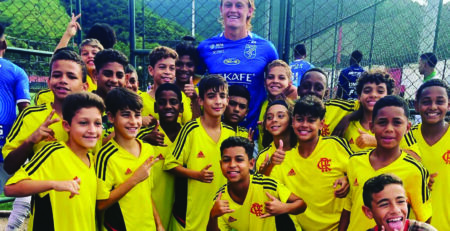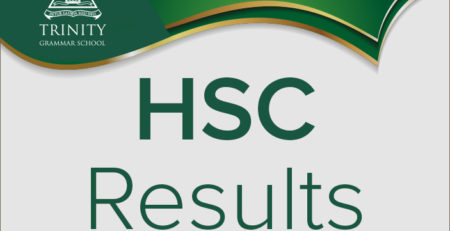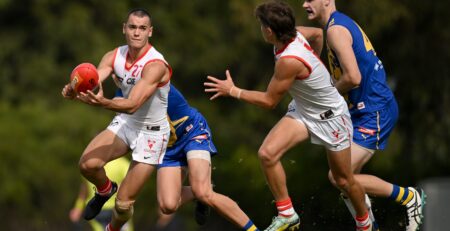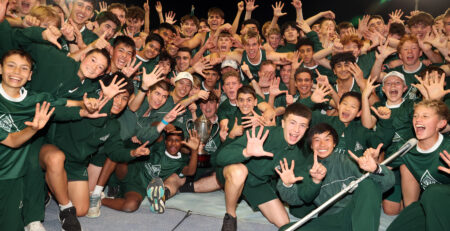Debating News | ISDA Octos 1 and FED Quarter-Final

YEAR 7 ISDA report – Trinity v St. Joseph’s College
It was Octos 1, we were finally in the knockout series of the ISDA season. We have practically always walked in with a mindset that, even if we lost, we at least knew what we needed to do better for the next debate. However now, instead of next debate, it would be next season. The stakes were extremely high; we were highly successful in our pool, coming away with five wins and two losses, and it would be a huge blow to us if we were to lose the first round of the knockouts. By the decision of the coin toss, we were allocated the negative case, and the topic was ‘That community service should be mandatory for all high school students”.
We raced to our prep room, (thanks to the fact that Trinity was hosting), and immediately started to brainstorm ideas. We came up with a counter model for the topic as we decided that it was the most appropriate way to go about this topic. Our counter model stated that ‘we will instead turn community service into an HSC elective, which will be judged upon by the effort that these students put into their work’. We slowly walked our way through our coach’s golden scaffold for winning a negative case, and steadily we made progress through it. When we finally finished it, we were confident that we were going to win this debate. Quickly everyone started to make their last-minute preparations for the debate. When time was finally up, we were all confident that we would be able to beat St Joseph’s.
Finally, the debate started. The affirmative team started the debate off by stating the multitude of benefits that community service would be able to provide the general population. He also explained why community service for high school students would be a huge benefit. Our first speaker was able to swiftly accept all those benefits by stating and thoroughly explaining our counter model. He then went on to explain how our model was a much better way to deal with the problem. This left the second affirmative scrambling for a way to attack our counter model. He tried to state how they can bring about a bigger population to do the tasks. Our second speaker immediately responded to that by saying how our world was more likely to see more people who were concentrated on what they were doing thus creating a better result. He also set the showground for the third negative to really make an impact. Third affirmative closed their case off strongly, but still with a lot of materials that our third speaker could refute. Finally, our third speaker closed the debate off by shutting down all the affirmative arguments. We were able to state the importance of choice when it comes to community service, essentially proving how we won on our grounds and winning on the opposition’s grounds.
The debate had finally come to an end, we all sat in anticipation as the adjudicator deliberated the results. Finally, it was time for the adjudication, the adjudicator started off with some helpful comments that we all thought were extremely useful, such as adapting better if someone else gave a counter model. The adjudicator then went through what he saw the debate come down to, three main issues. After a slow and arduous wait, finally the results came out, we had WON!
The debate was extremely interesting, and we greatly thank the opposition team for providing us with such a good debate. We thank all the parents and staff who have made this debate possible for all of us. We extend our gratitude to Mr Taplin for how much effort and time he put into organising this. We would love to thank the adjudicator for coming and adjudicating this debate. We have now walked past the first step, three steps left to go.
R. Qin (7 Yo)
YEAR 9 ISDA report – Monte v Trinity
Last Friday, the Year 9 ISDA team consisting of M. Padmore as 1st speaker, E. Ciarroni as 2nd, D. Lok as 3rd and C. Ciarroni as 4th speaker debated against Monte on the topic “That non-violent criminals should never be sent to prison”. As the negative team, we brought out a countermodel with a heavy focus on rehabilitation for drug related crimes, to cater to the mental needs of prisoners. We also focused on the danger that non-violent criminals pose to society, and the impact they can have on people’s lives, specifically using identity theft as a strong example. Monte’s main argument focused on the mental state of the criminals, and how prison is not a good place for them to be. However, our arguments focusing on the impracticalities of monitoring house arrest for cyber criminals, in addition to prison to deter, rehabilitate, and punish, helped our team to win the main issues of the debate. It was amazing to see so many spectators, as well as our first adjudicator in person for quite some time. Let’s hope the team can persevere through the final rounds of the competition!
C. Ciarroni (9 WJ)
YEAR 7 FED B report – SCECGS Redlands v Trinity
On Friday night, the Trinity Year 7 FED B team debated against SCECGS Redlands team in the quarter final, the topic of this debate was “That e-sports should be a part of the Olympics”. The Trinity team was allocated the negative side after a coin toss. This topic brought absolute silence to the prep room as our team studiously put together our ideas and points to create individual speeches. The nerves were building as our team were all reading over our speeches when someone knocked on our door and said, “That’s time!” Our team walked through the hallway to the debate room, while familiar faces of family members and supporters looked on, eager to see who would make it through the elimination round.
When we had all settled down in our seats, waiting to begin, the timekeeper said, “May I invite the first speaker of the SCECGS Redlands team to begin their teams’ case.” The first speaker stated some very strong points, but in-between those strong points, some flaws were to be noticed. Our team were listening carefully, trying to find something flawed in their case for rebuttal. When the first speaker of the affirmative team finished their speech, the first speaker of the Trinity team was invited to start their team’s case. D. Sealey (7 Sc) came out by analysing the main stakeholders of this debate and stating why if e-sports were to become a part of the Olympics, it would be bad for each of them. Then, he closed his case by proving that it would encourage video game addiction. The next speaker of the affirmative team walked on to start their speech. By starting with a few rebuttals, some points of the negative team’s case were shut down, but only to a certain extent. This was to be made clear when the Trinity team’s next speaker J. Chong (7 Hi) was invited to speak. He started by making sure he shut down most of the opponent team’s case, then went on by using a very good example of Pathos (an appeal to emotion), where he created a story, where someone had trained their whole life to become an athlete, only to be outshined at the Olympics by an e-sports player that only had to train for a few years. He then stated some more points to seal up his argument. Then, the third speaker of SCECGS Redlands was invited to speak. They used a very impactful technique of summarizing their team’s case, before saying some rebuttals to attempt to shut down the negative team’s case. The debate was in a 50/50 position, before the Trinity team’s third speaker, M. Licenblat (7 Du) walked on. With confidence, he reminded the adjudicator what points of the negative team’s case SCECGS had failed to rebut, went on by stating some rebuttals himself for the opponent’s case, then finished by summarising our team’s case.
After the debate, we were told to wait outside while the adjudicator gathered his thoughts and put together reasoning for his decision. When we were invited back in, the tension was high. He gave some general feedback for each person, then he stated who won the debate. The silence before this moment was deafening, but then he said, “Negative won”. Our whole team had to contain our excitement and joy, but high-fived each other to say congratulations! It was such a dramatic moment as we now knew that we would be in the semi-finals. The SCECGS Redlands team’s fourth speaker came up and thanked the Trinity team and the adjudicator for the debate and so did our fourth speaker A. Rabey (7 He), who wished the Redlands team all the best in their future debates.
Then, we went outside and congratulated each other, and our coach, Ms Dao.
D. Sealey (7 Sc)
YEAR 7 FED A report – Trinity v St. Aloysius’ College
Last Friday, the Trinity FED A debating team crossed minds with St Aloysius’ College. The topic was “That e-sports should be included in the Olympics”. Debating for the Trinity team was J. Wong (7 Du), D. Lin (7 Fo), T. Henry (7 Ta), and O. Hannan (7 Fo). The debate was held at Trinity. In this debate, for the first time all season, spectators have been allowed to watch the debate. This made for an exciting change to the debate and will make for a nice change going forward. In the debate, most of the arguments centred around what was classified as a sport and what the purpose of the Olympics really is. In the end, we did win this debate. We took home a win because we talked about how the Olympics were created for the sole purpose of watching people compete in physical sports. Video games, though, did not come under that umbrella, and that is why we won. However, for next week, we can improve our rebuttal and attempt a more comparative argument.
O. Hannan (7 Fo)
SENIOR FED B DEBATING REPORT – St. Aloysius’ College v Trinity
Last Friday evening the Senior FED B team competed in the FED quarter finals against St. Aloysius’ College. After a chaotic season of remote adjudicators and absences due to COVID-19, our team didn’t have high hopes of even making it to the knockout rounds! Nevertheless, we managed to make it through on account of the win/loss margins within our debates. We were drawn up against St. Aloysius’, whom we knew to have a strong team. The topic that we received was an intensely political one, comparing “good dictatorships” with “bad democracies”. Motivated by the idea of winning the entire competition and receiving lines on our blazers, we had a very focused prep time, and were able to thoroughly prepare for the debate. After a close debate we came out on top, and move onto the semi-finals, where we will be debating against St. Joseph’s, a team which narrowly beat us during the season. The team, consisting of L. Wingrave (11Ar), D. Eboli (11WH), M. Bhandari (11Mu) and T. La (11La) intend to do our best and hopefully progress to the Grand Final.
T. La (11La)



















